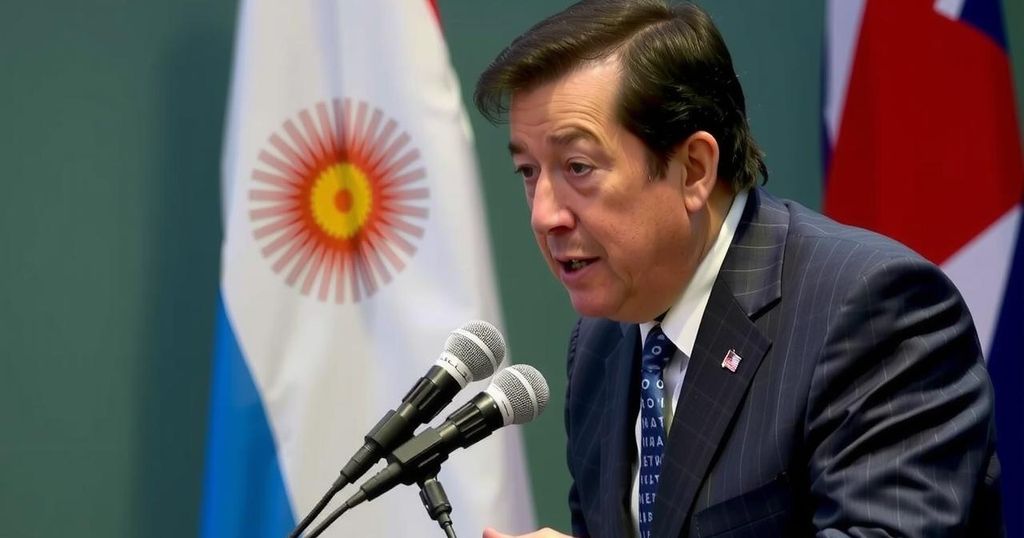Argentina’s President Javier Milei Dismisses Foreign Minister Following U.N. Vote on Cuba

Argentina’s President Javier Milei has dismissed Foreign Minister Diana Mondino following the nation’s support for a U.N. resolution aimed at lifting the U.S. embargo on Cuba. Gerardo Werthein has been appointed as her successor. Milei’s administration has emphasized a strong opposition to the Cuban regime and intends to audit the Foreign Relations Ministry amidst a shift in foreign policy towards closer ties with the U.S. and Israel.
On Wednesday, Argentina’s President Javier Milei dismissed Foreign Minister Diana Mondino shortly after the nation voted in favor of a United Nations resolution that sought to lift the U.S. economic embargo on Cuba. In her place, Gerardo Werthein, Argentina’s current ambassador to the United States, was appointed as confirmed by spokesman Manuel Adorni via social media. The reasons behind Mondino’s dismissal were not delineated explicitly; however, it followed backlash related to the controversial vote at the U.N. General Assembly. The President’s office clarified that the termination was directly connected to this issue, asserting that “Our country is categorically opposed to the Cuban dictatorship, and it will remain firm in promoting a foreign policy that condemns all regimes that perpetuate the violation of human rights and individual freedoms.” The United Nations resolution aimed at lifting the embargo received backing from 187 countries, whereas only the United States and Israel voted against it. Since assuming office in December 2023, Milei has notably realigned Argentina’s foreign policy to better align with U.S. and Israeli interests, notably expressing support for Israeli Prime Minister Benjamin Netanyahu’s administration during recent military actions in Gaza, which stands in stark contrast to the broader sentiment in Latin America. Countries such as Bolivia and Colombia have distanced themselves from Israel, with Brazil and various others recalling their ambassadors from Tel Aviv, further accentuating the regional discord on this matter. Mondino’s brief tenure as Foreign Minister had been plagued by controversies, including a recent withdrawal of a press release that incorrectly referred to the “Falklands” rather than the “Malvinas,” the term preferred in Argentina for the disputed territory. In another incident earlier in May, she faced criticism for comments made during her visit to China, where she remarked that “all Chinese look like the same,” leading to a perception of instability within her office. In response to Mondino’s departure, the Milei administration has initiated plans for an internal audit of the Foreign Relations Ministry, intending to uncover any personnel who may be advocating for policies at odds with the government’s positions on freedom and human rights. As Argentina navigates these significant changes, the potential ramifications of this shift in foreign policy on its international relations remain uncertain, with Milei’s government positioned to redefine its diplomatic approach amid a constantly evolving geopolitical environment.
The dismissal of Foreign Minister Diana Mondino by President Javier Milei has triggered discussions within the context of Argentina’s foreign policy realignment, particularly in relation to the U.S. and Israeli interests. Since taking office, Milei has expressed clear opposition to the Cuban regime while favoring policies that align Argentina closely with U.S. foreign strategies and Israeli governmental actions. This shift follows a history of complex relationships within Latin America regarding Cuba and Israel, further highlighted by regional nations’ responses to Israel’s actions in Gaza and the united stance against the U.S. embargo.
In conclusion, the dismissal of Diana Mondino highlights a decisive turn in Argentina’s foreign policy under President Javier Milei, reinforcing its alignment with U.S. stances and a condemnation of regimes viewed as authoritarian. The internal audit planned for the Foreign Relations Ministry indicates a focused effort to maintain a coherent foreign policy that reflects the government’s human rights agenda, although the anticipated impact of these changes on Argentina’s international relations remains to be observed.
Original Source: www.newsweek.com








